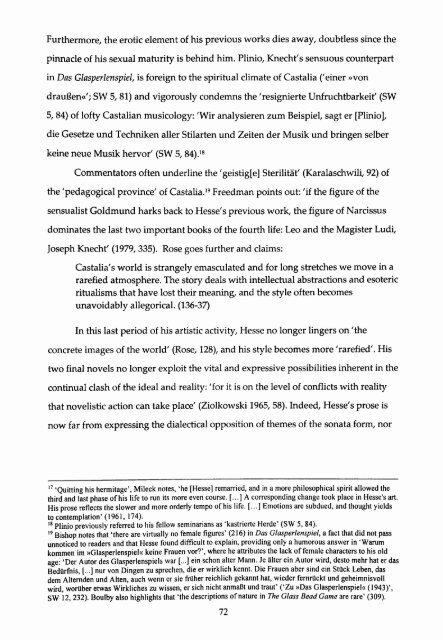HERMANN HESSE AND THE DIALECTICS OF TIME Salvatore C. P. ...
HERMANN HESSE AND THE DIALECTICS OF TIME Salvatore C. P. ...
HERMANN HESSE AND THE DIALECTICS OF TIME Salvatore C. P. ...
Create successful ePaper yourself
Turn your PDF publications into a flip-book with our unique Google optimized e-Paper software.
Furthermore, the erotic element of his previous works dies away, doubtless since the<br />
pinnacle of his sexual maturity is behind him. Plinio, Knecht's sensuous counterpart<br />
in Das Glasperlenspiel, is foreign to the spiritual climate of Castalia ('einer »von<br />
draufien«'; SW 5, 81) and vigorously condemns the 'resignierte Unfruchtbarkeit' (SW<br />
5, 84) of lofty Castalian musicology: 'Wir analysieren zum Beispiel, sagt er [Plinio],<br />
die Gesetze und Techniken aller Stilarten und Zeiten der Musik und bringen selber<br />
keine neue Musik hervor' (SW 5, 84). 18<br />
Commentators often underline the 'geistig[e] Sterilitat' (Karalaschwili, 92) of<br />
the 'pedagogical province' of Castalia. 19 Freedman points out: 'if the figure of the<br />
sensualist Goldmund harks back to Hesse's previous work, the figure of Narcissus<br />
dominates the last two important books of the fourth life: Leo and the Magister Ludi,<br />
Joseph Knecht' (1979, 335). Rose goes further and claims:<br />
Castalia's world is strangely emasculated and for long stretches we move in a<br />
rarefied atmosphere. The story deals with intellectual abstractions and esoteric<br />
ritualisms that have lost their meaning, and the style often becomes<br />
unavoidably allegorical. (136-37)<br />
In this last period of his artistic activity, Hesse no longer lingers on 'the<br />
concrete images of the world' (Rose, 128), and his style becomes more 'rarefied'. His<br />
two final novels no longer exploit the vital and expressive possibilities inherent in the<br />
continual clash of the ideal and reality: 'for it is on the level of conflicts with reality<br />
that novelistic action can take place' (Ziolkowski 1965, 58). Indeed, Hesse's prose is<br />
now far from expressing the dialectical opposition of themes of the sonata form, nor<br />
17 'Quitting his hermitage', Mileck notes, 'he [Hesse] remarried, and in a more philosophical spirit allowed the<br />
third and last phase of his life to run its more even course. [...J A corresponding change took place in Hesse's art.<br />
His prose reflects the slower and more orderly tempo of his life. [...] Emotions are subdued, and thought yields<br />
to contemplation' (1961, 174).<br />
18 Plinio previously referred to his fellow seminarians as 'kastrierte Herde' (SW 5, 84).<br />
19 Bishop notes that 'there are virtually no female figures' (216) in Das Glasperlenspiel, a fact that did not pass<br />
unnoticed to readers and that Hesse found difficult to explain, providing only a humorous answer in 'Warum<br />
kommen im »Glasperlenspiel« keine Frauen vor?', where he attributes the lack of female characters to his old<br />
age: 'Der Autor des Glasperlenspiels war [...] ein schon alter Mann. Je alter ein Autor wird, desto mehr hat er das<br />
Bediirfnis, [...] nur von Dingen zu sprechen, die er wirklich kennt. Die Frauen aber sind ein Stuck Leben, das<br />
dem Alternden und Alten, auch wenn er sie friiher reichlich gekannt hat, wieder fernrUckt und geheimnisvoll<br />
wird, worliber etwas Wirkliches zu wissen, er sich nicht anmaBt und traut' ('Zu »Das Glasperlenspiel« (1943)',<br />
SW 12, 232). Boulby also highlights that 'the descriptions of nature in The Glass Bead Game are rare' (309).<br />
72
















